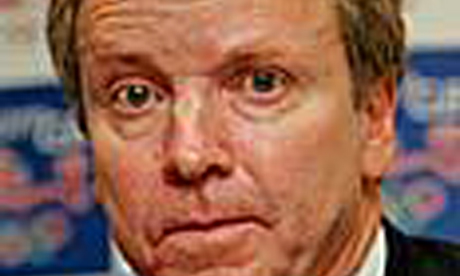Olympic chief calls for ‘mandatory’ funding for local sports facilities
The chairman of the British Olympic Association, Lord Moynihan, has called on the government to make local authority spending on recreation facilities mandatory to bring about a “sea change” in faltering attempts to boost the number of people playing sport as an Olympic legacy.
With just over a year to the London Games, Sport England and the government have admitted they are highly unlikely to hit the target set by the previous administration of getting 1 million more people playing sport at least three times a week by 2013.
“Local authorities should be mandated to provide recreational facilities, as they are in Scotland, rather than it being the first thing to go in difficult economic times,” said Moynihan, a former Conservative sports minister.
“That should be one of the components of an overall sports legacy programme. We need to leave a sports legacy of a different magnitude from the one we had before we were awarded the Games.”
Heavy cuts to local authority budgets have raised fears that non-statutory leisure budgets will be among the first to be hit, more than cancelling out any increased investment linked to the Games.
Lord Coe, chairman of the London organising committee, helped win the Games for London on the back of a series of promises about the legacy they would leave.
In addition to regenerating east London and inspiring young people through sport, the government resolved to boost the number of active adults. Labour set a target of 1 million more playing sport three or more times a week, and a further million engaging in more physical activity by 2013. Sport England was charged with delivering the first of those missions. More than halfway through the four-year period covered by the Whole Sport Plan, in which £480m is being invested through sports governing bodies, the figure has gone up by just 100,000. The number of people playing no sport at all has continued to increase.
“It’s important to have a target, but it’s precise numerical character is not that important, because this is not going to be achieved by lots of little steps,” said Sport England’s chief executive, Jennie Price. “It’s creating that critical mass and momentum.”
Price said that she believed the approach could still bear fruit if it reached a tipping point, but only if more sports followed the lead of cycling and netball and fundamentally rethought their approach.
“It has to be participant-led. They can do this, but they have to do it now in order to maintain confidence in their ability to deliver.”
The sports minister, Hugh Robertson, said: “I don’t think we should be under any illusion whatsoever that this is going to be a very tough ask. It’s trying to do something that no other Olympic city has achieved.”
He added: “What you’re seeing now is partly the teething problems of a new system and partly the fact that we underestimated how long it would take to turn this ship around. We are discovering that the hard way.”
Seventeen sports have seen a decrease in the number of people participating once a week since 2007-08, while only four – athletics, mountaineering, netball and table tennis – have recorded a statistically significant increase.
The Football Association, the Rugby Football Union and the Lawn Tennis Association have all launched mass participation schemes in an attempt to shift their stalled figures.
If they do not, the government has said their funding will be severely cut from 2013.
In a bid to tackle the failing participation legacy scheme, a new £135m strategy dubbed Places, People, Play was announced last autumn.
Price said it was too soon to say whether the Whole Sport Plan investment had failed. ” We created a very different sort of system in which we said here is the money and here are the very specific results we want. It took a while for the governing bodies to realise we meant it – and also to realise what they needed to do.”
Sport England’s review
Basketball: Has “struggled to address the decline in weekly participation among young people aged between 16 and 19”. Recently had its funding award docked for failing to deliver.
Cricket: Faces a “significant challenge” to achieve its 2013 participation target, with the number of adults playing the game in gradual decline. But satisfaction among those playing cricket continues to increase and more women are playing.
Cycling: Provides “some of the best examples of a national governing body working hard to understand and satisfy its customers” with mass participation initiatives such as Skyride.
Football: The FA “is not currently on track to achieve its four-year target for growing participation”. Its new Just Play initiative will be critical.
Netball: An “excellent example of a governing body taking a participant-centred approach to its work”. Has “developed a really significant understanding about what current and former players want from the game”.
Rugby union: Recently had its funding docked for missing targets, must focus on small sided, tag and touch rugby alongside the traditional 15-a-side game if it is to grow participation.
Swimming: “Has failed to generate growth in swimming participation and needs to continue to improve its activities.” Needs to focus on converting infrequent swimmers into weekly participants.
Tennis: “The next six months are critical if the LTA is to reverse the downward trend in weekly tennis participation and maintain current levels of investment.”
guardian.co.uk © Guardian News & Media Limited 2010
Published via the Guardian News Feed plugin for WordPress.

